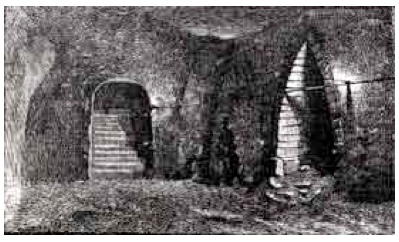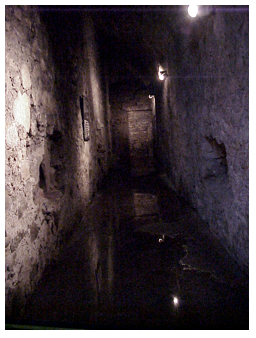- institutions and the specific types of power they hold over us (the army, police, organised practices/behaviours such as the family/marriage)
- the way institutions frame our behaviour
- UNDERSTAND THE PRINCIPLES OF THE PANOPTICON
- UNDERSTAND MICHEL FOUCAULT’S CONCEPT OF ‘DISCIPLINARY SOCIETY’
- CONSIDER THE IDEA THAT DISCIPLINARY SOCIETY IS A WAY OF MAKING INDIVIDUALS ‘PRODUCTIVE’ AND ‘USEFUL’
- UNDERSTAND FOUCAULT’S IDEA OF TECHNIQUES OF THE BODY AND ‘DOCILE’ BODIES
Michel Foucault
(1926-1984)
Madness & Civilisation
Discipline & Punish: The Birth of the Prison
- UNDERSTAND MICHEL FOUCAULT’S CONCEPT OF ‘DISCIPLINARY SOCIETY’
- CONSIDER THE IDEA THAT DISCIPLINARY SOCIETY IS A WAY OF MAKING INDIVIDUALS ‘PRODUCTIVE’ AND ‘USEFUL’
- UNDERSTAND FOUCAULT’S IDEA OF TECHNIQUES OF THE BODY AND ‘DOCILE’ BODIES
The Panopticon
Michel Foucault
(1926-1984)
Madness & Civilisation
Discipline & Punish: The Birth of the Prison
- madness was not historically a recognised condition
- modern forms of discipline
- deconstructing the strict binary oppositions relevant in society
‘Houses of correction’ to curb unemployment and idleness
- middle ages - there was no strict convention of what "madness" was - people suffering from it were accepted in society
- late 1600s - new sensibilty emerged towards work and the social usefulness of work - not only to make things but also to make people better
- all of the people who were defined as being able to effective workers were stigmatised and forced to work
- Houses of correction - big work houses built for the mad, criminals, drunks, vagabonds, the diseased, single mothers where they were assigned work and forced into it.
- a very crude way of making the socially unproductive productive
- labour as an exercise of moral reform
The emergence of forms of knowledge – biology, psychiatry, medicine, etc., legitimise the practices of hospitals, doctors, psychiatrists.
The Birth of the Asylum
- eventually these houses of correction were seen as a massive mistake
- the insane would corrupt the sane, etc
- specialist institutions emerged, like prisons, hospitals, asylums, etc
- they now not only housed them, but "corrected" them
- new legislations were passed to allow this
- these institutions worked on correcting the inmates in a very different way from the houses of correction
- instead of physical violence as a tool to make people behave the way you wanted, they were treated like children - reducing status
- if they behaved appropriately, they were rewarded - if they misbehaved they were chastised - by a paternal figure
- these were new specialised, predominately mental, forms of control and correcting the population
- modifying peoples attitudes and the way they behaved/thought
The emergence of forms of knowledge – biology, psychiatry, medicine, etc., legitimise the practices of hospitals, doctors, psychiatrists.
- new authority figures and ways of control
- experts in behaviour
Foucault aims to show how these forms of knowledge and rationalising institutions like the prison, the asylum, the hospital, the school, now affect human beings in such a way that they alter our consciousness and that they internalise our responsibility.
- in these institutions, they started to take responsibility for their own actions - which starts the process of appropriate behaviour
- taking responsibility for our own conformity
- particularly modern style of discipline
- served as a visible reminder of the power the state and institutions have over the inmates
- a sign of the power of the state - reminder not to test it
- punishment that works on fear
- Guy Fawkes and his punishment
“That you be drawn on a hurdle to the place of execution where you shall be hanged by the neck and being alive cut down, your privy members shall be cut off and your bowels taken out and burned before you, your head severed from your body and your body divided into four quarters to be disposed of at the King’s pleasure.” - the sovereign's power over the masses
DISCIPLINARY SOCIETY
AND
DISCIPLINARY POWER
- a new form of disciplinary power that fuses all aspects of our lives
- modern discipline is a technique that involves surveillance as opposed to physical punishment
- ultimate aim = to make us more useful in modern society
Jeremy Bentham’s Design The Panopticon
Proposed 1791
- designed to be multifunctional
- asylums, prisons, schools, etc- cells for individuals around the outside
- modern panopticon:
- designed so the inmates are staring/facing into the central observation tower depending on the usage- inmates in the cells cannot see each other, only the guards in the centre
- opposite of dungeon where everything is dark and hidden - panopticon = everything is lit and can be seen - observational
- always being watched so you would never behave in the way the supervisor wouldn't want you do
- no point in misbehaving because you would be spotted
- permanently isolated or with whom you can interact
- style of mental torture
- panopticons aren't popular now due to the adverse mental effects they have on people
PANOPTICISM
‘Hence the major effect of the Panopticon: to induce in the inmate a state of conscious and permanent visibility that assures the automatic functioning of power.’ (Foucault, 1975)
- eventually no guards are needed as it starts to function by itself due to the fear of the guards due to the shape of the building
- panopticon as an allegory for how our society disciplines or controls
- starts to function like a laboratory
- allows scientists/psychiatrists to carry out experiments on the inmates
- a system for classifying and scrutinising
- discipline for Foucault is about making people productive
- works through the notion of an institutional gaze
- patriarchal gaze of society onto women forces them to act or adapt to a certain way to please the males with their social definition of women
- panopticon reflects the way women would behave under the gaze
- starting to behave the way they think the institution would want them to behave
- model of how our world trains us and keeps us under control
- for it to work there has to be the understanding that you are always under scrutiny
- open plan office
- modern panopticon
- form of panoptican power
- workers can be constantly seen by the boss, always working
- changes the behaviour of the workers due to the visibility and layout of the office
- The Office - television series depicting the principles of modern panopticism
- starting to act up to the notion of how office workers should behave
- institutional roles
- design of open plan bars means that everything is visible to bouncers and bar staff
- closed off areas of pubs allow the customer to relax more - less scrutiny
- modern methods of surveillance - taking away privacy
- every single action in our lives is in some way under scrutiny, being recorded
- barriers between every single person in the lecture - can only see the lecturer
- structure is supposed to maximise the learning potential from the lecture
- lecturer can see everything and everyone - affects and controls the behaviour of people in the lecture
- surrounded by an institutional apparatus with codes of behaviour
- register - we sign in and attend classes because we know that it is being recorded and there will be discipline if we don't
- making the process of learning more effective/productive
- training and forcing people to behave in a certain way
- self regulation discipline
- office at College with locked drawers containing records and information on every single member of staff - they are under these institutions as well as students
- always being watched and scrutinised
- mental effect and process - no physical coercion
- has a real physical effect on the body
- produces docile bodies - opposite of sleepy/lazy
- docile body is more physically adept than the normal body
- e.g. a soldier - carrying out orders obediently
- hyper efficient - hyper productive
- "cult of health" - everywhere surroundings there are warnings about what you should be doing to stay fit and healthy
- starting to conform and train
- acting in our interests
- same situation as was in Nazi Germany
- television and internet are being powers in this
- cannot say that one person has power over another, such as men having power over women
- Foucault - it is a relationship where they are willingly within a relationship of control
- key to an emancipated society - understanding how power relationships work
- where there is power, there is always the possibility of resistance
- constant panoptic system
- thought systems to try to defeat the state










































